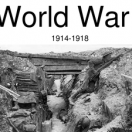World War I (often abbreviated as WWI or WW1), also known as the First World War or the Great War, was a global war originating in Europe that lasted from 28 July 1914 to 11 November 1918. Contemporaneously described as "the war to end all wars", it led to the mobilisation of more than 70 million military personnel, including 60 million Europeans, making it one of the largest wars in history. It is also one of the deadliest conflicts in history,with an estimated nine million combatants and seven million civilian deaths as a direct result of the war, while resulting genocides and the resulting 1918 influenza pandemic caused another 50 to 100 million deaths worldwide.
On 28 June 1914, Gavrilo Princip, a Bosnian Serb Yugoslav nationalist, assassinated the Austro-Hungarian heir Archduke Franz Ferdinand in Sarajevo, leading to the July Crisis.In response, on 23 July, Austria-Hungary issued an ultimatum to Serbia. Serbia's reply failed to satisfy the Austrians, and the two moved to a war footing.
A network of interlocking alliances enlarged the crisis from a bilateral issue in the Balkans to one involving most of Europe. By July 1914, the great powers of Europe were divided into two coalitions: the Triple Entente—consisting of France, Russia, and Britain—and the Triple Alliance of Germany, Austria-Hungary, and Italy (the Triple Alliance was only defensive in nature, allowing Italy to stay out of the war until April 1915, when it joined the Allied Powers after its relations with Austria-Hungary deteriorated). Russia felt it necessary to back Serbia and, after Austria-Hungary shelled the Serbian capital of Belgrade on the 28 July, approved partial mobilisation.Full Russian mobilisation was announced on the evening of 30 July; on the 31st, Austria-Hungary and Germany did the same, while Germany demanded Russia demobilise within twelve hours. When Russia failed to comply, Germany declared war on Russia on 1 August in support of Austria-Hungary, with Austria-Hungary following suit on 6 August; France ordered full mobilisation in support of Russia on 2 August
German strategy for a war on two fronts against France and Russia was to rapidly concentrate the bulk of its army in the West to defeat France within six weeks, then shift forces to the East before Russia could fully mobilise; this was later known as the Schlieffen Plan. On 2 August, Germany demanded free passage through Belgium, an essential element in achieving a quick victory over France

